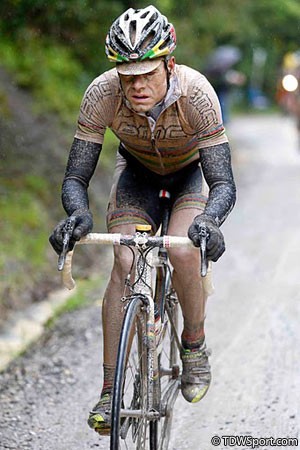Cautions against assuming everyone under scrutiny is guilty
 The 2009 world road race champion Cadel Evans has said that he believes that people should wait before judging those involved in the US federal investigation currently underway in relation to the US Postal Service team.
The 2009 world road race champion Cadel Evans has said that he believes that people should wait before judging those involved in the US federal investigation currently underway in relation to the US Postal Service team.
Seven-time Tour de France winner Lance Armstrong, team manager Johan Bruyneel and a number of other riders and staff have been accused of either doping or facilitating the performance-enhancing substance use of others. US federal investigators and anti-doping officials travelled to France last week and met with counterparts from Italy, France and Belgium. Indications from those meetings were that the investigation is producing results, and is getting closer to a conclusion.
While Evans didn’t defend Armstrong as such, he did say that he thinks that people should reserve judgement until a conclusion is reached.
“Innocent until proven guilty,” he told the Sydney Morning Herald, when asked about the issue.
“’Someone being accused or investigated doesn’t mean they’re guilty. OK, when they’re proved to be guilty let’s hope justice is done … and you’re punishing people for wrongdoing. But as cyclists [just because] you finished the Tour de France well doesn’t mean you’re a drug cheat, but sometimes you get painted with that brush unfortunately and it’s not a nice feeling,” Evans, twice a Tour de France runner-up, said.
The Australian sees one benefit of the current probe; namely, that if those concerned are ultimately judged to be in the clear, it could give them a greater credibility as a result.
“I think if anyone is investigated and then cleared, well then they’re more innocent than anyone who’s not investigated aren’t they?” he asked rhetorically. “But also unfortunately people, and sometimes rightly so, attach investigation and accusation with guilt, which isn’t always the case.”
Evans is speaking from the point of view of a professional rider in a sport where there is sometimes the widespread assumption amongst the general public that all the competitors are breaking the rules to compete. That is something which is perhaps understandable after the stream of doping stories that have emerged in recent years, but he argues that it is neither accurate nor fair.
“We feel a little bit overly scrutinised sometimes. Cycling [bosses] are doing the right thing to try to clean up the sport and they’re really doing it with transparency,” he stated. “But just because they catch one … doesn’t mean everyone’s a cheat,” he explained.
Evans works with the coach and scientist Aldo Sassi, who has the reputation of being a strong anti-doping campaigner. He only works with those who agree to a battery of tests, including a whole-body haemoglobin assessment. It is regarded as a good way to monitor athletes and ensure they are not using blood transfusions and other such banned methods.